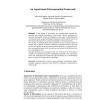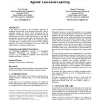1047 search results - page 28 / 210 » Learning the required number of agents for complex tasks |
COBUILD
1998
Springer
13 years 11 months ago
1998
Springer
Abstract. As the amount of information and communication increases dramatically new working environments must provide efficient mechanisms to maximize the benefits of these develop...
EUSFLAT
2001
13 years 9 months ago
2001
The correction of angular misalignment between mating components is a fundamental requirement for their successful assembly. In this paper we present how a learning agent based on...
JMLR
2010
13 years 2 months ago
2010
Sequential algorithms of active learning based on the estimation of the level sets of the empirical risk are discussed in the paper. Localized Rademacher complexities are used in ...
ACOM
2004
Springer
14 years 1 months ago
2004
Springer
In this paper, we will consider the alignment of heterogeneous ontologies in multi agent systems. We will start from the idea that each individual agent is specialized in solving ...
ATAL
2006
Springer
13 years 11 months ago
2006
Springer
In this paper, we propose a new integration approach for simulation and behaviour in the learning context that is able to coherently manage the shared virtual environment for the ...


